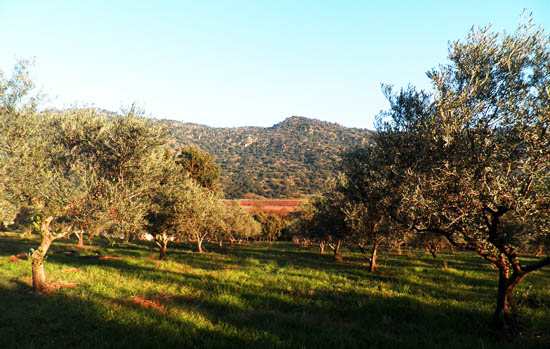 Deficient irrigation of olive groves is a bet to be considered in the short/medium term, with positive results in the production and quality of olive oil, due to the scarcity of water resources and the cost of water. The conclusion is from a study developed by researchers from four Portuguese higher education institutions.
Deficient irrigation of olive groves is a bet to be considered in the short/medium term, with positive results in the production and quality of olive oil, due to the scarcity of water resources and the cost of water. The conclusion is from a study developed by researchers from four Portuguese higher education institutions.
“The physical-chemical parameters of oil quality, such as acidity, peroxide index, among others, are not affected by the type of irrigation. The polyphenol content was higher in treatments with poor irrigation, which translates into more bitter and spicy oils”, reveals researcher Anabela Fernandes Silva, from the Center for Research and Agro-Environmental and Biological Technologies (CITAB), and project coordinator at the University of Trás-os-Montes and Alto Douro (UTAD).
The study, developed in partnership between CITAB/UTAD, the Escola Superior Agrária de Bragança (ESAB), the University of Évora and the Institute of Agricultural Technological Sciences, took place at Quinta do Carrascal, owned by the company VIAZ, located in Vale da Vilariça, in Vila Flor.
The main objective of the investigation was to evaluate "the effects of different deficit irrigation strategies compared to maximum irrigation on plant water relations, on vegetative and productive response, as well as on oil quality, with a view to sustainable management of water use of watering in the olive grove”, explains Anabela Fernandes Silva.
The effects of the irrigation strategy on the efficiency of mechanical olive harvesting and soil water erosion were also evaluated in the study.
“With regard to mechanized harvesting, work capacity, fruit strength and weight, no differences were detected between the different irrigation equipment applied”, guarantees Arlindo Almeida, from ESAB.
In addition, the team of researchers realized that the oil content obtained was higher when the amount of irrigation water was halved, compared to the maximum irrigation, which could be a mechanism for the plant to recover oil production.
On the other hand, “the reduction of irrigation water during the summer months caused a decrease in the weight of the olives and also in the pulp/stone ratio. But, at the harvest in November, these differences no longer exist, as a result of the autumn rains”, indicates Anabela Fernandes Silva, from CITAB.
The results of the project “Deficit irrigation in the olive tree in the region of Terra Quente Transmontana (IrrigOlive)” will be presented in a Workshop to be held on June 5th, at the Vila Flor City Hall Auditorium.
“Disclosure will allow agents in the sector to adopt measures aimed at improving yields, production and the quality of olive groves and olives,” assures the also professor of the Department of Agronomy at UTAD.
Responsibles from institutions and companies linked to agriculture, technicians and producers are expected. Participation is free but subject to registration via e-mail [email protected] or telephone 259 350 410, until June 2, 2015.


















Comments